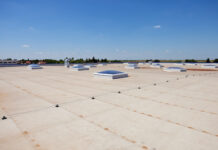By Bob Lester
The COVID-19 pandemic created an uptick in overall traffic in many parking lots across the country. Parking lots were leveraged in a variety of ways to support businesses — serving as dining areas, vaccination clinics, or even drive-through celebration sites. With this increase in vehicle traffic, asphalt paving services may be needed sooner to revitalize heavily used parking lots. Before you begin your next asphalt repair or sealcoating project, save yourself valuable time and resources by avoiding these common maintenance mistakes.

1. Sealcoating your lot too often.
Sealcoating protects your parking lot while also beautifying your property, and it can decrease costly repairs or replacement down the road.
However, it is possible to be too proactive in sealcoating your parking lot. In fact, sealcoating your parking lot too often can create a buildup that causes cracks and peeling. Aim to sealcoat your lot every 2-3 years. When evaluating if your lot needs to be sealcoated, review the amount of traffic your lot experienced over the past year as well as how harsh weather conditions may have impacted its appearance.
Schedule your parking lot maintenance project early in the year, and keep in mind there is an ideal timeline for when you should schedule asphalt repair and sealcoating. Repair work can be done in early spring, and is less dependent on weather conditions. For the best sealcoating results, temperatures need to warm enough for proper curing, typically 55 degrees or above for a 24-hour period.
If you maintain a regular sealcoating schedule, you can expect your parking lot to last anywhere from 20 to 25 years before asphalt resurfacing is necessary. Of course, extreme weather conditions or traffic patterns may decrease the lifespan of your parking lot.
2. Not preparing properly for contractors.
Before you even begin to think about hiring a contractor, spend time inspecting your parking lot yourself to understand the scope of your project. Identify areas that may need repairs before sealcoating or resurfacing so you can have an informed discussion with your contractor about what needs done and what your priorities will be.
Prior to obtaining sealcoating and repair quotes, be sure to move any objects or vehicles that may obstruct the estimator’s view of damage. Before sealcoating or filling cracks, a good contractor will do much to prepare the surface of the parking lot and clear any cracks that will be filled. Most will use weed-whackers to remove weeds and blowers to remove mulch, dirt and debris. You may also want to consider killing weeds with an herbicide like Round-Up prior a week or so prior to the project. Also be sure that your contractor treats oil spots with an acrylic primer. Without applying primer, the sealcoat may not stick on the oil spots. Taking the time to properly prep the parking lot goes a long way to produce the most attractive appearance and long-lasting surface.
3. Choosing a contractor solely based on price.
As with most things in life, when it comes to choosing a contractor, the cheapest option may not be the best one. Choosing a contractor based solely on price could result in the use of lower quality materials or workmanship. You may be able to find someone willing to give you a lower price to win the job, but it may not be worth sacrificing quality or service when those savings may cost you more in the long run.
Being up front with contractor about your budget will help you work with your contractor to prioritize repair needs based on how much you are able to spend. It’s not in anyone’s best interest for the estimator to work up a quote that winds up being entirely beyond what you are willing or able to invest.
To find a qualified contractor, begin by checking Google reviews and look for a variety of experiences. The most reputable companies will provide references upon request. When meeting with potential contractors, ask yourself whether it seems that they are looking out for your best interest or only trying to make a sale. Find a contractor who takes the time to ask detailed questions to understand what is most important when it comes to your parking lot maintenance needs, rather than just taking measurements and sending a quote.
Another sign of a trustworthy contractor is the length of time they have been in business. A long-standing asphalt paving business generally speaks highly of its quality.
4. Attempting a DIY option for repairs.
Sometimes facility managers think they can save money by attempting repairs themselves. This may be okay sometimes just to get by, but in the long run, hastily done repairs can result in more expensive maintenance needs later on.
Occasionally, property managers sometimes don’t know that materials that commercial pavers use are different and higher quality than what can be purchased in stores. As an example, Dura-Seal fills potholes with a hot mix asphalt that lasts much longer than do-it-yourself cold patch, meant for temporary repair.
Professional contractors also use tools that are strong enough to fully dig out potholes and then refill a larger square area around it rather than simply filling a hole, resulting in not only a more durable repair but also a more attractive one.
Even worse than cold patch, filling potholes yourself with gravel or stone can actually quickly loosen and spread out the existing hole, making for a much larger and more expensive problem in months to come. If a pothole creates a safety hazard, the best option may be to cover the deficit with a cone until you are able to get repairs done.
Finding a trusted professional asphalt paving contractor who can identify the ideal maintenance timeline for your project and provide individualized project estimates is the best way to keep your parking lot appearance its best for as long as possible.
 Bob Lester is president and CEO of Columbus, OH-based Dura-Seal, a sealcoating, asphalt, and concrete services company. He has worked in the paving industry for over 20 years, leading two buyouts, an acquisition, and the sale of an equipment manufacturing company at Dura-Seal. Prior to joining the company, Bob studied business finance at Otterbein University.
Bob Lester is president and CEO of Columbus, OH-based Dura-Seal, a sealcoating, asphalt, and concrete services company. He has worked in the paving industry for over 20 years, leading two buyouts, an acquisition, and the sale of an equipment manufacturing company at Dura-Seal. Prior to joining the company, Bob studied business finance at Otterbein University.



















![[VIDEO] Collect Asset Data at the Speed of Walking a Building](https://facilityexecutive.com/wp-content/uploads/2024/02/maxresdefault-324x160.jpg)